Elon Musk has stepped down as a Special Government Employee, concluding his role as a Special Government Employee. As head of the Department of Government Efficiency (DOGE), Musk aimed to cut bureaucratic waste, a mission he insists will persist beyond his tenure. For supply chain leaders, the departure could signal shifting dynamics in regulatory and efficiency reform efforts under the Trump administration.
Musk Steps Down from DOGE
In a post on X, Elon Musk confirmed he is stepping down from his role within the Trump administration, citing the end of his “scheduled time” as a Special Government Employee. Musk was appointed to lead the Department of Government Efficiency (DOGE), a newly created agency charged with trimming federal waste and streamlining bureaucratic operations.
“I’m thankful for the opportunity to reduce wasteful spending,” Musk said. “The DOGE mission will only strengthen over time as it becomes a way of life throughout the government.”
Although details of the department’s measurable impact remain sparse, Musk’s involvement brought a high-profile push to challenge status-quo inefficiencies in federal programs—echoing lean principles familiar to operations and logistics professionals.
His exit comes amid broader speculation about the direction of Trump’s second-term policy apparatus, particularly in areas affecting industrial regulation, procurement reform, and federal supply chain oversight. While Musk’s direct involvement in operational policymaking was limited, his advocacy of performance-based models sparked discussion across both public and private sectors.
Potential Policy Drift as Musk Departs
Musk’s exit leaves questions around whether the Trump administration will maintain momentum around operational efficiency, or pivot to other priorities. During his tenure, DOGE promoted automation in federal procurement, advocated for consolidated logistics contracts, and encouraged performance-based budgeting. These measures, if followed through, could have long-term implications for public-private partnerships in infrastructure and federal sourcing.
For supply chain executives, particularly those engaged in federal contracting or infrastructure projects, Musk’s departure warrants monitoring. If DOGE initiatives are diluted or deprioritized, ongoing projects tied to government efficiency drives may lose steam, altering timelines or shifting criteria for vendor selection.
Moreover, Musk’s influence extended beyond policy into public sentiment. His presence lent a veneer of innovation and urgency to an otherwise arcane area of government reform. Without his backing, the optics, and possibly the accountability, around reform efforts could change.
Musk’s Exit Tests Supply Chain Reform
Musk’s departure ends a brief, high-visibility experiment in applying private-sector efficiency thinking to federal operations. For supply chain leaders, it’s not the exit that matters, but what follows. If the Trump administration sustains DOGE’s priorities, contractors may see a push for leaner, faster federal engagements. If not, the effort may join the long list of short-lived reform attempts. Either way, the implications warrant close attention.




